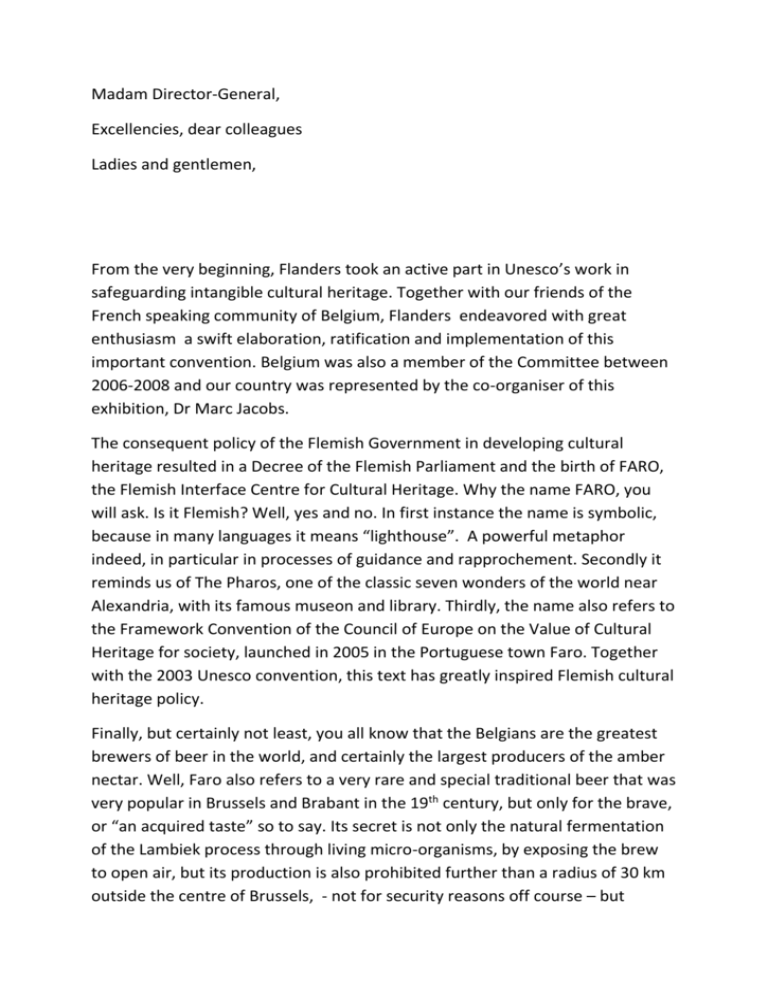Madam Director
advertisement

Madam Director-General, Excellencies, dear colleagues Ladies and gentlemen, From the very beginning, Flanders took an active part in Unesco’s work in safeguarding intangible cultural heritage. Together with our friends of the French speaking community of Belgium, Flanders endeavored with great enthusiasm a swift elaboration, ratification and implementation of this important convention. Belgium was also a member of the Committee between 2006-2008 and our country was represented by the co-organiser of this exhibition, Dr Marc Jacobs. The consequent policy of the Flemish Government in developing cultural heritage resulted in a Decree of the Flemish Parliament and the birth of FARO, the Flemish Interface Centre for Cultural Heritage. Why the name FARO, you will ask. Is it Flemish? Well, yes and no. In first instance the name is symbolic, because in many languages it means “lighthouse”. A powerful metaphor indeed, in particular in processes of guidance and rapprochement. Secondly it reminds us of The Pharos, one of the classic seven wonders of the world near Alexandria, with its famous museon and library. Thirdly, the name also refers to the Framework Convention of the Council of Europe on the Value of Cultural Heritage for society, launched in 2005 in the Portuguese town Faro. Together with the 2003 Unesco convention, this text has greatly inspired Flemish cultural heritage policy. Finally, but certainly not least, you all know that the Belgians are the greatest brewers of beer in the world, and certainly the largest producers of the amber nectar. Well, Faro also refers to a very rare and special traditional beer that was very popular in Brussels and Brabant in the 19th century, but only for the brave, or “an acquired taste” so to say. Its secret is not only the natural fermentation of the Lambiek process through living micro-organisms, by exposing the brew to open air, but its production is also prohibited further than a radius of 30 km outside the centre of Brussels, - not for security reasons off course – but because of the numerous specialized and traditional processes the beer has to undergo. Living cultural heritage par excellence! Charles Baudelaire, was not convinced of its taste. In 1864, when he was in exile in Brussels he wrote: “Le faro, c’est une bière deux fois bue”! Ladies and gentlemen, Flanders and Belgium may be small on the world map, but we do have a cultural heritage that goes back to the dim and distant past of European history. Tangible as well as intangible heritage prosper in Flanders and Flemings in general have a great pride in it. But cultural heritage is not only about conservation and protection, it is also about policy improvement , global sharing and opening up to the rest of the world. That is why the Flemish government has always been a great supporter of Unesco and will remain so in the future with projects that help other nations, for instance in Afrika and Latin-America, to achieve their ambitions and to realize their policies towards their own cultural heritage. In this perspective, I always remember the words of the Greek philosopher: what is the point of having a rare and valuable thing of great beauty, if you cannot share it with your friends. The development and implementation of a consistent cultural heritage policy is one of the cardinal cultural priorities of the Flemish Government for the next five years. Consequently the Flemish Agency for Arts and Heritage engaged in an intensive dialogue with numerous stakeholders, academics and key players in the field of culture. The result of this broad debate should be an extensive report, with innovative and specific proposals for the new Flemish policy on cultural heritage. To paraphrase Sir Winston Churchill, this exhibition is not the end. It is not even the beginning of the end. But it is most certainly the end of the beginning of a fundamental debate, it is the aurora of an intellectual safari, to explore the limits and the possibilities to recognize cultural heritage. The fundamental process of reaching out, comparing ideas, successes and failures has started. For Flanders this dialogue is crucial and inherent to the very notion of cultural heritage. Consequently we are very grateful to Unesco, and in particular to its director-general and the Intangible Heritage Section, for the opportunity to give the necessary impetus to this dialogue. It goes without saying that I would also like to thank our American partners for the inspiration and the great support. Flanders , the low countries and the US go back a long time ! - founding fathers – great to do something together in Unesco. Finally I am very happy to host the reception on behalf of the Flemish Government. It goes without saying that we could not have a Belgian reception with two delights of our tangible heritage, beer and chocolates. Two great assets to start a dialogue between all of you about cultural heritage later on, so please enjoy the beer and the chocolate, but do beware as they can have a devastating effect on your personal biological heritage.






